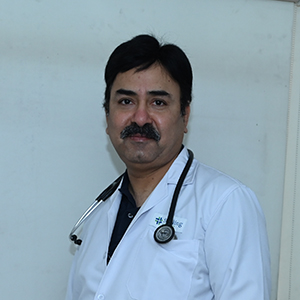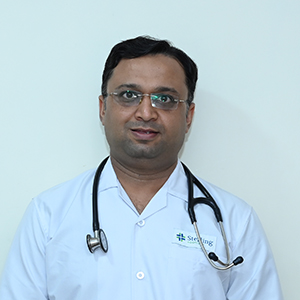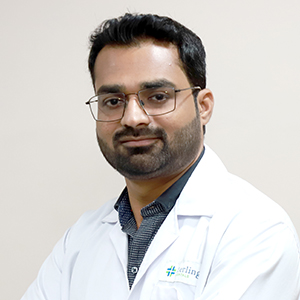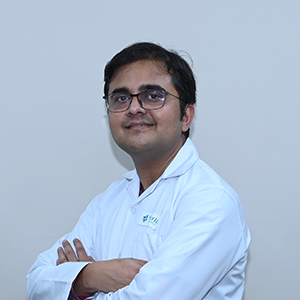Cardiology
If you're looking for the best hospitals for angioplasty, Sterling Hospitals Rajkot 's Department of Cardiology is a top choice. Our heart centre in offers advanced diagnostic tests and treatments, including coronary artery disease treated with angioplasty and stenting.
We are proud to offer two state-of-the-art flat panel Cath labs that are well-equipped with modern technology to provide unmatched outcomes in the treatment of coronary artery disease, including angioplasty and stenting. Our advanced colour Doppler echocardiography system and non-invasive cardiology labs, equipped with advanced electrocardiography computerized TMT, Transesophageal Echocardiography, Dobutamine Echocardiography, computerized Holter monitoring units, and TILT table testing, allow us to provide accurate diagnoses and personalized treatment plans for our patients.
We understand that the cost of heart stent operations in can be a concern for patients and their families. At Sterling Hospitals Rajkot , we strive to provide the best care possible at an affordable cost. Our team of dedicated interventional cardiologists and state-of-the-art Cath labs ensure that our patients receive the best possible outcomes for their cardiac ailments.
If you or a loved one is in need of angioplasty or other cardiac treatment, we invite you to explore our facilities and learn more about our advanced technology and experienced medical team. At Sterling Hospitals Rajkot , we are committed to providing our patients the highest level of care.
Conditions We Treat
- Coronary Artery Diseases (CAD): This is a condition where the blood vessels that supply blood and oxygen to the heart become narrowed or blocked. This can lead to chest pain (angina), heart attack, and other serious heart problems.
-
Rheumatic heart disease (RHD): This is a heart condition caused by a complication of rheumatic fever, which can damage heart valves, leading to symptoms such as shortness of breath, chest pain, and palpitations.
-
Hypertensive Heart Disease: This refers to a heart condition due to high blood pressure, which can lead to thickening and enlargement of the heart, as well as coronary artery diseases, heart failure, and other heart conditions.
-
Angina: This is a type of chest pain that occurs when the heart muscle doesn't get enough blood and oxygen, usually due to narrowed or blocked blood vessels.
-
Arrhythmia: This is an abnormal heart rhythm that can cause the heart to beat too fast, too slow, or irregularly. It can lead to symptoms such as palpitations, shortness of breath, and dizziness.
-
Heart Failure: This is a condition where the heart is unable to pump blood effectively, leading to symptoms such as shortness of breath, fatigue, and swelling in the legs and ankles.
-
Valvular Heart Disease: This is a condition where one or more of the heart valves are damaged or not functioning properly, leading to symptoms such as shortness of breath, chest pain, and palpitations.
-
Congenital Heart Disease: This is a condition where the heart or blood vessels near the heart don't develop properly before birth, leading to various heart problems such as holes in the heart, valve problems, and abnormal blood vessels.
Coronary Artery Disease (CAD)
At the Cardiology Department of Sterling Hospitals Rajkot Rajkot , we deal with Coronary Artery Disease (CAD), also known as coronary heart disease or ischemic heart disease. It is a condition that causes an insufficient supply of oxygen-rich blood to the heart, leading to symptoms such as chest pain and shortness of breath. CAD can be of three types, including obstructive and non-obstructive coronary artery disease, and spontaneous coronary artery dissection (SCAD).
The major cause of CAD is the deposition of cholesterol or plaque in arteries that supply blood to the heart. Several risk factors such as high blood pressure, diabetes, smoking, a sedentary lifestyle, and a family history of heart disease are associated with CAD. CAD can be diagnosed through several screening tests such as ECG, echocardiogram, blood tests, exercise stress test, cardiac catheterization, angiogram, and coronary artery calcium scan.
CAD can be managed through lifestyle changes, medication, surgeries, and procedures. At our Cardiology Department, we offer advanced treatment options such as angioplasty and stenting, and coronary artery bypass graft (CABG) surgery, depending on the severity of the heart condition. We aim to provide comprehensive care to our patients and help them live healthier life.
Rheumatic heart disease (RHD)
Rheumatic heart disease (RHD) is a serious condition that affects the heart valves and is commonly seen in developing countries. According to the World Health Organization (WHO), RHD is responsible for 250,000 deaths of young people worldwide each year. RHD is a post-infectious result of acute rheumatic fever, which is caused by an autoimmune inflammatory reaction to a bacterial infection, specifically streptococcal pharyngitis or strep throat.
When a person contracts rheumatic fever, many connective tissues throughout the body can be affected, including those in the heart, joints, skin, and brain. Over time, the heart valves can become swollen and deformed, leading to narrowing or leaking valves, which makes it harder for the heart to work normally. If left untreated, RHD can eventually cause heart failure, which can be fatal.
There are several types of heart problems that can be linked to RHD, with the most common being valvular heart disease. Other forms of heart problems that can be associated with RHD include pericarditis, which is inflammation and damage to the outer layer of the heart sac; endocarditis, which is inflammation of the inner lining or layer of the heart; and heart block, which makes the heartbeat slow or skip beats and prevents the heart from pumping blood effectively.
RHD is caused by an abnormal immune response to streptococcal pharyngitis that leads to deformity of the valve. The damage can cause valvular stenosis and/or regurgitation. RHD typically develops in stages, with acute rheumatic fever occurring around three weeks after group A streptococcal pharyngitis. After multiple episodes of rheumatic fever, fibrosis of heart valves can occur, which can cause rheumatic valvular heart disease. If the valves remain untreated, heart failure and death may occur.
Screening for RHD is essential to ensure early detection and effective treatment. An echocardiogram (echo) is a sensitive and cost-effective method to screen for RHD. During the test, ultrasound (high-frequency sound waves) from a hand-held wand placed on the chest provides pictures of the heart's valves and chambers, and helps to evaluate the pumping action of the heart. An echo can detect the valve flaps, leaky valve, fluid around the heart, and heart enlargement. It is the most useful test for diagnosing heart valve problems.
Other tests that may be used to screen for RHD include an electrocardiogram (ECG), a chest X-ray, cardiac MRI, and blood tests. An ECG records the strength and timing of the electrical activity of the heart, showing abnormal rhythms (arrhythmias or dysrhythmias) and can sometimes detect heart muscle damage. A chest X-ray is done to check the lungs and heart enlargement, while a cardiac MRI is an imaging test that takes detailed pictures of the heart and may be used to get a more precise look at the heart valves and heart muscle. Blood tests may also be used to check infection and inflammation.
The treatment of RHD depends upon the severity and damage to the heart valve. In severe cases, surgeries are done to replace or repair the damaged valve. However, the best treatment is to prevent rheumatic fever from occurring in the first place. People with rheumatic fever are often given daily or monthly antibiotic treatment to prevent recurrent infections and lower the risk of further heart damage. Medicines like aspirin, steroids, etc may also be prescribed.
If you or someone you know is experiencing symptoms of RHD, it's important to seek medical attention right away. At Sterling Hospitals Rajkot Rajkot , the cardiology department is equipped with the latest
Hypertensive Heart Disease
About Hypertensive Heart Disease:
Hypertensive heart disease is a heart condition that arises due to high blood pressure, which can lead to severe heart problems like thickening of heart muscles, coronary artery diseases, heart failure, and other heart conditions. It is the most common cause of death from high blood pressure.
Type:
Hypertensive heart disease can be classified into two types:
-
Narrowing of the blood vessels: Increased pressure inside the wall of arteries causes narrowing of the blood vessels. This condition affects the normal functioning of the heart. The blood flow to the heart may slow or even stop, and can result in a condition known as coronary artery disease or heart attack.
- Thickening and enlargement of the heart: Due to increased blood pressure, the heart finds it difficult to pump blood normally. The regular and repeated hard work affects the heart muscles causing thickening and enlargement. These changes in the heart affect the normal pumping action and can cause conditions like left ventricular hypertrophy (enlarged heart - LVH). LVH ultimately compresses the arteries and the surrounding structure of the heart. This can result in heart failure, arrhythmia, stroke, and sudden cardiac death.
Causes:
Hypertensive heart disease occurs as a result of long-term uncontrolled high blood pressure. High blood pressure means the pressure inside the blood vessels is too high. Most patients do not know if they are suffering from hypertension. They do not have symptoms until late in the course when complications arise.
Stages:
Hypertensive heart disease is typically not described in various stages. The condition usually progresses from minor changes to major changes in the heart and can lead to the following sequence: increased wall stress leads to left ventricular hypertrophy (LVH), which leads to diastolic LV dysfunction. This can be followed by systolic LV dysfunction.
Screening:
Laboratory tests are important for detecting the root cause of hypertension and the severity of the organ damage. Following tests are included:
-
Electrocardiogram – It monitors and records the heart’s electrical activity. The doctor will attach patches to the patient’s chest, legs, and arms. The results will be visible on a screen, and the doctor will interpret them.
-
Echocardiogram -It gives a detailed picture of the patient’s heart using ultrasound. Transthoracic echocardiography (TTE) may be very useful.
-
Coronary angiography- It checks the flow of blood through the coronary arteries.
-
Exercise stress test - It looks at how exercise affects the heart. Patients are asked to pedal an exercise bike or walk on a treadmill.
-
Nuclear stress test – It examines the flow of blood into the heart. The test is usually conducted while the patient is resting and exercising.
Other tests include urinalysis, blood glucose and hematocrit levels, lipid profile, serum potassium, creatinine (or the corresponding estimated glomerular filtration rate [GFR]), and calcium measurements.
Treatment:
The treatment of hypertensive heart disease depends on the patient’s age, the severity of illness, and medical history. Common medications used are calcium channel blockers and ACE inhibitors to help lower blood pressure, aspirin, and statins. Services and therapies for severe heart conditions include implantation of a pacemaker, cardioverter-defibrillators (ICDs), coronary artery bypass graft surgery (CABG), a heart transplant or other heart-assisting devices.
In conclusion, if you or someone you know is experiencing symptoms of hypertension, it is important to seek medical attention from a cardiologist as soon as possible. The Cardiology Department of Sterling Hospitals Rajkot is equipped with state-of-the-art facilities and experienced cardiologists who can provide accurate diagnosis and effective treatment for hypertensive heart disease. Contact the Cardiology Department of Sterling Hospitals Rajkot today to schedule a consultation with one of our expert cardiologists.
Angina
Angina is a medical condition characterized by chest pain or discomfort, caused by reduced blood flow to the heart muscle. It is typically caused by a build-up of plaque in the coronary arteries, which supply oxygen-rich blood to the heart. This build-up can narrow the arteries and reduce blood flow to the heart, leading to chest pain, shortness of breath, and other symptoms.
Types of Angina:
-
Stable Angina: It is the most common type of angina, where chest pain or discomfort is triggered by physical exertion, stress or emotional distress.
-
Unstable Angina: Chest pain or discomfort occurs even at rest or with minimal exertion, and may indicate an impending heart attack.
-
Variant Angina (Prinzmetal's Angina): Chest pain or discomfort occurs due to spasms in the coronary arteries, which usually occurs during rest.
Causes: Angina is primarily caused by the build-up of plaque in the coronary arteries, which may be due to high cholesterol levels, high blood pressure, smoking, diabetes, and a sedentary lifestyle. Other factors include stress, alcohol consumption, obesity, and a family history of heart disease.
Stages: Angina can progress from stable to unstable angina, which can lead to a heart attack. If left untreated, angina can also cause heart failure or sudden cardiac arrest.
Screening: To diagnose angina, doctors at the Cardiology Department of Sterling Hospitals Rajkot may conduct a physical exam, including an electrocardiogram (ECG), stress test, echocardiogram, and coronary angiography. Blood tests may also be done to check for high cholesterol, diabetes, or other conditions.
Treatment: The goal of treatment is to relieve chest pain, prevent complications, and reduce the risk of heart attack or death. Treatment options include medication, lifestyle changes, and surgery or procedures such as angioplasty or coronary artery bypass graft surgery (CABG). Patients may also benefit from cardiac rehabilitation, which includes exercise, diet, and stress management.
If you or someone you know is experiencing symptoms of angina, it is important to seek medical attention from a cardiologist as soon as possible. The Cardiology Department of Sterling Hospitals Rajkot has a team of experienced cardiologists and advanced diagnostic and treatment facilities to provide the best possible care for patients with angina and other heart conditions.
Arrhythmia
At the Department of Cardiology Sterling Hospitals Rajkot , we have seen many patients with arrhythmia, a condition where the heart beats irregularly or too fast/slow. Arrhythmia can be harmless or life-threatening, and it is important to seek medical attention if you suspect you have it.
There are several types of arrhythmia, including atrial fibrillation, supraventricular tachycardia, and ventricular fibrillation. Causes of arrhythmia can include heart disease, high blood pressure, and electrolyte imbalances. Sometimes, the cause is unknown.
Arrhythmia can occur in stages, starting with occasional palpitations and progressing to more frequent and severe symptoms, such as shortness of breath and chest pain. It is important to identify and treat arrhythmia early to prevent complications such as stroke or sudden cardiac death.
Screening for arrhythmia may include an electrocardiogram (ECG), a Holter monitor, or an event monitor. Treatment options vary depending on the type and severity of the arrhythmia, but may include medications, cardiac ablation, or implantation of a pacemaker or defibrillator.
At the Cardiology Department of Sterling Hospitals Rajkot , we offer comprehensive care for patients with arrhythmia. Our team of experienced cardiologists uses state-of-the-art technology and techniques to accurately diagnose and treat arrhythmia. We work closely with our patients to create individualized treatment plans and provide ongoing support to help manage their condition.
Heart Failure
Heart failure, also known as congestive heart failure, is a condition where the heart is unable to pump enough blood to meet the body's demands. It can affect either the right or left side of the heart, or both, and can be chronic or acute. Heart failure is a serious condition and can be life-threatening if left untreated.
Types: Heart failure is classified into two types:
-
Systolic heart failure: The left ventricle of the heart becomes weakened and can't pump enough blood to meet the body's needs.
-
Diastolic heart failure: The left ventricle of the heart becomes stiff and can't fill with blood properly, leading to a decreased amount of blood being pumped out.
Causes: Heart failure can be caused by a variety of factors, including:
-
Coronary artery disease
-
High blood pressure
-
Diabetes
-
Valve disease
-
Cardiomyopathy
-
Congenital heart defects
-
Infections
-
Alcohol or drug abuse
-
Obesity
Stages: Heart failure is typically classified into four stages, ranging from mild to severe. The stages are based on the symptoms experienced by the patient, as well as the functional capacity of the heart.
Screening: The diagnosis of heart failure is typically made through a combination of physical examination, medical history, and diagnostic tests, such as blood tests, electrocardiogram (ECG), echocardiogram, and stress tests.
Treatment: Treatment of heart failure depends on the underlying cause and severity of the condition. Common treatments include lifestyle changes, medication, and surgical interventions. Lifestyle changes may include dietary modifications, exercise, and weight management. Medications may include diuretics, beta-blockers, ACE inhibitors, and angiotensin receptor blockers (ARBs). Surgical interventions may include heart valve repair or replacement, pacemaker implantation, and heart transplant.
Valvular Heart Disease:
Valvular heart disease is a condition in which the heart's valves do not function properly, leading to a disruption in the normal blood flow. The heart has four valves that regulate the flow of blood in and out of the heart's chambers. Valvular heart disease can affect any of these valves and can be a result of a congenital defect or acquired condition. If left untreated, valvular heart disease can lead to heart failure, stroke, or even death.
Types of Valvular Heart Disease:
-
Mitral valve stenosis: narrowing of the valve opening that restricts blood flow
-
Mitral valve regurgitation: the valve doesn't close properly, allowing blood to flow back into the heart's upper chamber
-
Aortic valve stenosis: narrowing of the valve opening that restricts blood flow
-
Aortic valve regurgitation: the valve doesn't close properly, allowing blood to flow back into the heart's lower chamber
Causes of Valvular Heart Disease:
-
Congenital heart defects
-
Rheumatic fever
-
Age-related wear and tear
-
Endocarditis (infection of the heart valves)
Stages of Valvular Heart Disease:
-
Stage 1: mild valve disease
-
Stage 2: moderate valve disease
-
Stage 3: severe valve disease
-
Stage 4: severe valve disease with symptoms
Screening for Valvular Heart Disease includes:
-
Echocardiogram: a test that uses sound waves to create images of the heart's valves and chambers
-
Electrocardiogram (ECG): a test that measures the electrical activity of the heart
-
Chest X-ray: to check the size of the heart and the blood vessels leading to and from the heart
Treatment for Valvular Heart Disease depends on the severity of the disease, and can include:
-
Medications to control blood pressure and heart rate
-
Valvuloplasty: a procedure to widen a narrowed valve
-
Valve repair: a surgical procedure to fix a damaged valve
-
Valve replacement: a surgical procedure to replace a damaged valve with an artificial valve
At the Cardiology Department of Sterling Hospitals Rajkot, we provide comprehensive care for patients with valvular heart disease. Our team of experienced cardiologists uses the latest diagnostic and treatment techniques to ensure the best possible outcomes for our patients. We work closely with each patient to develop an individualized treatment plan that meets their unique needs and goals.
Some of the common interventional cardiology procedures performed at the Department of Cardiology, Sterling Hospitals Rajkot include
-
Angioplasty - It is a procedure to widen narrowed or blocked blood vessels of the heart (coronary arteries) using a small balloon catheter. It is often performed in conjunction with stent placement to prevent the artery from narrowing again.
-
Coronary stenting - It is a procedure to insert a small metal mesh tube (stent) into a narrowed or blocked coronary artery to keep it open and improve blood flow to the heart.
-
Cardiac catheterization - It is a diagnostic procedure to check the blood flow to the heart and the severity of heart disease. A thin, flexible tube is inserted into an artery or vein in the arm or leg and is guided to the heart.
-
Electrophysiology studies - It is a diagnostic procedure to identify and locate abnormal electrical pathways in the heart that cause arrhythmias. Small wires are passed through a catheter into the heart and electrical signals are recorded.
-
Transcatheter aortic valve replacement (TAVR) - It is a minimally invasive procedure to replace a damaged aortic valve in the heart. A catheter is used to insert a new valve, which expands and replaces the old valve
If you're looking for the best heart doctor in Rajkot , look no further than Sterling Hospital. Our team of cardiologists and cardiac surgeons have years of experience in treating a wide range of heart conditions, including performing angioplasties. They are dedicated to staying up-to-date with the latest advancements in cardiac care, so you can be sure that you're receiving the best possible treatment.
Don't wait to get the care you need. Contact us today to learn more about our services and schedule a consultation with one of our heart specialists. We're here to help you every step of the way.
Angioplasty
Angioplasty is a common treatment option for people with coronary artery disease, which occurs when the arteries that supply blood to the heart become narrowed or blocked by plaque build-up. This can lead to chest pain, shortness of breath, and other symptoms, and in severe cases, it can cause a heart attack.
Angioplasty is also used to treat other conditions that affect the blood vessels, such as peripheral artery disease and carotid artery disease. The procedure can help improve blood flow to the affected area, relieve symptoms, and reduce the risk of complications such as heart attack or stroke.
Over the years, several new technologies have been developed to improve the safety and effectiveness of angioplasty. One such technology is drug-eluting stents, which are coated with medication that helps prevent the formation of scar tissue and reduces the risk of the artery narrowing again. Another advancement is the use of intravascular ultrasound, which allows doctors to see inside the blood vessels and get a more accurate picture of the extent of the blockage.
Other technologies used in angioplasty include rotational atherectomy, which uses a high-speed rotating device to break up calcified plaque, and laser angioplasty, which uses a laser to vaporize the blockage. These advanced techniques have made angioplasty a safer and more effective treatment option for patients with coronary artery disease and other vascular conditions.
If you're experiencing symptoms of coronary artery disease or other vascular conditions, it's important to talk to your doctor about your treatment options. Angioplasty may be a viable option to help improve your symptoms and reduce your risk of complications. At Sterling Hospital in Rajkot , Rajkot , our team of experienced cardiologists and cardiac surgeons is dedicated to providing our patients with the highest quality care using the latest technologies available.
Coronary stenting
Coronary stenting is a medical procedure used to treat coronary artery disease (CAD) by opening up blocked or narrowed arteries in the heart. During this procedure, a small, metal mesh tube called a stent is inserted into the blocked or narrowed area of the artery to help keep it open and restore blood flow to the heart.
The stent is typically inserted using a catheter, which is a long, thin tube that's inserted into a blood vessel in the arm, groin, or neck and guided to the blocked artery in the heart. Once the catheter is in place, a small balloon on the end is inflated, which pushes the plaque or blockage against the walls of the artery and opens it up. The stent is then placed in the affected area to help keep the artery open and prevent it from collapsing or becoming blocked again.
At Sterling Hospital Rajkot , we use the latest technologies and techniques to perform coronary stenting procedures. Our team of experienced cardiologists and cardiac surgeons work closely with each patient to develop a personalized treatment plan based on their individual needs and medical history.
Coronary stenting is a safe and effective treatment option for many patients with CAD. It can help relieve symptoms such as chest pain, improve blood flow to the heart, and reduce the risk of heart attack or other complications. If you have been diagnosed with CAD or are experiencing symptoms such as chest pain or shortness of breath, it's important to talk to your doctor about your treatment options, including coronary stenting
Electrophysiology studies (EPS)
At Sterling Hospital Rajkot , we have a team of highly skilled cardiologists and cardiac electrophysiologists who use the latest technologies and techniques to perform electrophysiology studies. Our state-of-the-art cardiac catheterization lab is equipped with advanced imaging technology and computerized monitoring systems, ensuring the highest level of accuracy and precision during the procedure.
During an EPS, our team will carefully insert catheters into specific areas of the heart and use them to stimulate the heart and record its electrical activity. This information is then analyzed to identify any abnormal heart rhythms and determine the best course of treatment.
Depending on the results of the EPS, treatment may involve medication, catheter ablation, implantation of a pacemaker or defibrillator, or other interventions. Our team works closely with each patient to develop a personalized treatment plan based on their individual needs and medical history.
At Sterling Hospital Rajkot , we are committed to providing the highest quality of care to our patients. If you are experiencing symptoms of an arrhythmia or have been diagnosed with a heart condition that may require an EPS, our team of experts is here to help. Contact us today to schedule a consultation with one of our cardiac electrophysiologists.
FAQ’s
Which hospital is best for the heart in Rajkot ?
Sterling Hospital in Rajkot , is one of the most trusted names when it comes to heart treatment in the city. Our hospital has some of the best heart doctors in who are dedicated to providing the best possible care to our patients.
If you're looking for the best heart doctor in Rajkot , look no further than Sterling Hospital. Our team of cardiologists and cardiac surgeons have years of experience in treating a wide range of heart conditions, including performing angioplasties. They are dedicated to staying up-to-date with the latest advancements in cardiac care, so you can be sure that you're receiving the best possible treatment.
Who are the top heart specialists in Rajkot ?
If you or a loved one is in need of an angioplasty, rest assured that you will be in good hands at Sterling Hospital. We have state-of-the-art facilities and equipment that are necessary for performing the procedure. Our team of experienced cardiologists and cardiac surgeons will work together to provide you with a personalized treatment plan that meets your specific needs.
What causes heart failure?
Causes: Heart failure can be caused by a variety of factors, including:
-
Coronary artery disease
-
High blood pressure
-
Diabetes
-
Valve disease
-
Cardiomyopathy
-
Congenital heart defects
-
Infections
-
Alcohol or drug abuse
-
Obesity
What’s the most common heart disease?
As a leading hospital for heart treatment, Sterling Hospital Rajkot provides comprehensive care for a wide range of heart conditions. However, the most common heart disease treated at our hospital is coronary artery disease (CAD), which occurs when the arteries that supply blood to the heart become narrowed or blocked by plaque build-up.
Our team of experienced cardiologists and cardiac surgeons uses the latest technologies and techniques to diagnose and treat CAD and other types of heart disease. Depending on the severity of the condition and the individual needs of each patient, treatment options may include lifestyle changes such as diet and exercise, medications, angioplasty, or CABG.
We understand that living with a heart condition can be challenging, which is why we're committed to providing compassionate and personalized care to all of our patients. Our team takes a multidisciplinary approach to treatment, working closely with other specialists such as nutritionists and physical therapists to help patients manage their condition and improve their overall health and quality of life.
What is the most common heart procedure?
The most common heart procedure is coronary angiography, which is a diagnostic test used to evaluate the health of the coronary arteries. During a coronary angiography, a small tube called a catheter is inserted into an artery in the groin or arm and guided to the heart. A special dye is injected through the catheter, which makes the coronary arteries visible on X-ray images. The test allows doctors to see if there are any blockages or narrowing in the coronary arteries, which can help guide further treatment decisions

















